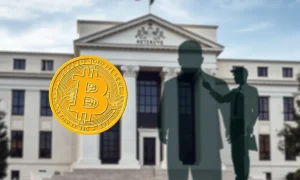The landscape of global finance is continually evolving. A significant development is currently unfolding within the United States’ central banking system. Reports indicate that a prominent crypto investor is under consideration to fill a crucial US Federal Reserve Board of Governors seat. This potential appointment could profoundly influence the nation’s monetary policy and, consequently, the trajectory of digital assets. For business leaders and entrepreneurs, understanding this intersection of traditional finance and the burgeoning crypto world is paramount.
The Vacancy: A Pivotal Crypto Fed Seat Opportunity
A key position on the Federal Reserve Board of Governors recently became vacant. Member Adriana Kugler announced her resignation, effective August 1. This departure opens the door for a new nominee from the current presidential administration. The individual selected for this **crypto Fed seat** will hold significant sway over the country’s economic direction. They will help shape decisions on federal interest rates, financial regulation, and the overall stability of the US economy.
The Federal Reserve Board of Governors plays a vital role in setting monetary policy. This includes managing inflation, fostering maximum employment, and ensuring financial system stability. Consequently, each appointment to this board carries immense weight. The current consideration of individuals with ties to the cryptocurrency sector highlights a growing recognition of digital assets’ importance within the broader financial system.
Key Contenders and Their Crypto Connections
US President Donald Trump is reportedly considering four individuals to replace Adriana Kugler. According to a Reuters report published on Thursday, the candidates include economic adviser Kevin Hassett and former Fed governor Kevin Warsh. Two other unnamed individuals are also reportedly under consideration. The chosen nominee, once confirmed by the US Senate, will wield considerable influence over monetary policy decisions.
Kevin Hassett: A Direct Stake in Digital Assets
Kevin Hassett, who also served as director of the National Economic Council under Trump, possesses a direct financial interest in the cryptocurrency space. He disclosed holding a stake in Coinbase Global. This stake was valued between $1 million and $5 million as of June. Hassett’s personal investment in a major cryptocurrency exchange underscores his familiarity with the digital asset market. Furthermore, his previous role as a top economic adviser suggests a deep understanding of macroeconomic principles.
His potential appointment could bring a unique perspective to the Federal Reserve. This perspective would blend traditional economic policy with a direct appreciation for the mechanics and potential of cryptocurrencies. Consequently, his presence might lead to more informed discussions about integrating digital assets into the mainstream financial system.
Kevin Warsh: Championing Blockchain Technology
Another prominent candidate, Kevin Warsh, previously served as a Fed governor from 2006 to 2011. Warsh has openly expressed his views on blockchain technology. He reportedly stated that blockchain could significantly benefit the US central bank’s payment systems. His insights suggest a forward-thinking approach to financial infrastructure.
In 2018, Warsh remarked, as reported by The New York Times, “Congress gave the Fed a monopoly over money.” He further elaborated on the potential disruption from cryptocurrencies: “And if the next generation of cryptocurrencies look more like money and less like gold — and have less volatility associated with them so they would be not just a speculative asset but could be a reliable unit of account — as a purely defensive matter I wouldn’t want somebody to take that monopoly from me.” This statement reveals his strategic thinking regarding the Fed’s role in a rapidly evolving financial landscape. Warsh’s deep understanding of central banking, combined with his interest in emerging technologies, makes him a compelling candidate for this **crypto Fed seat**.
Monetary Policy Implications: A Crypto Fed Seat’s Influence
The individual confirmed for this position will significantly influence the nation’s monetary policy. This includes crucial decisions on federal interest rates. These rates directly impact borrowing costs, consumer spending, and business investment. Consequently, they affect nearly every sector of the US economy, including digital assets.
A Fed governor with a strong understanding of cryptocurrencies could advocate for policies that acknowledge the unique characteristics of digital assets. They might push for regulatory frameworks that foster innovation while mitigating risks. Conversely, a lack of understanding could lead to policies that inadvertently stifle growth or create unnecessary barriers. Therefore, the background of the incoming governor is highly relevant to the crypto market.
Impact on US Markets and Digital Assets
Federal Reserve policies profoundly influence US markets. Changes in interest rates, for instance, affect the attractiveness of various asset classes. When interest rates rise, traditional investments like bonds may become more appealing, potentially drawing capital away from riskier assets like cryptocurrencies. Conversely, lower rates can encourage investment in higher-risk, higher-reward assets.
A governor familiar with digital assets might consider the specific implications of monetary policy on the crypto market. This could lead to more nuanced policy discussions. For example, they might explore how inflation targets or liquidity operations affect stablecoins or decentralized finance (DeFi) protocols. Ultimately, the presence of a crypto-aware voice on the board could lead to policies that are more adaptive to the modern financial ecosystem.
Trump’s Stance on the Fed and Crypto Regulation
President Trump has a documented history of clashing with Fed Chair Jerome Powell, whom he nominated during his first term. The president has consistently challenged the Fed’s independence in determining federal interest rates. Many legal experts have suggested that Trump lacks the authority to fire Powell without cause. However, an April Supreme Court decision expanded presidential powers over agencies previously considered independent. That decision upheld Trump’s ability to remove members of the National Labor Relations Board and the Merit Systems Protection Board. This ruling could potentially embolden a president to exert more influence over the Fed.
Beyond the Fed’s independence, Trump has also expressed views on cryptocurrency. Reports indicate his administration might take steps to protect the crypto industry. For example, a recent report suggested Trump would sign an executive order punishing financial institutions for ‘debanking’ crypto companies. Furthermore, there have been discussions about allowing crypto in 401(k) plans for US workers. These actions signal a potentially more favorable regulatory environment for digital assets under his administration. This context makes the **crypto Fed seat** nomination even more significant.
The Evolving Regulatory Landscape for Digital Assets
The appointment of a new Fed governor with crypto ties could accelerate the development of clearer regulatory guidelines for digital assets. Currently, the regulatory landscape for cryptocurrencies in the US is complex and fragmented. Various agencies, including the SEC, CFTC, and Treasury, all have some jurisdiction. A cohesive approach from the Federal Reserve could provide much-needed clarity.
A Fed governor familiar with blockchain technology might advocate for:
- Standardized definitions for different types of digital assets.
- Clearer rules for stablecoins and their reserves.
- Guidelines for financial institutions interacting with crypto.
- Exploration of a US Central Bank Digital Currency (CBDC) with appropriate safeguards.
These developments would provide greater certainty for investors and businesses operating in the crypto space. They could also pave the way for broader institutional adoption of digital assets. The incoming governor’s perspective will undoubtedly shape these discussions.
Why This Crypto Fed Seat Matters for the Future of Finance
The potential appointment of a crypto-aware individual to the Federal Reserve Board signifies a pivotal moment. It represents the increasing convergence of traditional finance and the innovative world of digital assets. The decisions made by the Federal Reserve impact everything from consumer loans to international trade. Therefore, having a voice on the board that understands the nuances of cryptocurrencies is increasingly crucial.
The global financial system is undergoing a significant transformation. Blockchain technology and digital assets are at the forefront of this change. As such, central banks worldwide are grappling with how to integrate these new technologies responsibly. The US Federal Reserve’s approach will set a precedent for other nations. A well-informed **crypto Fed seat** could help ensure the US remains a leader in financial innovation while maintaining stability.
This nomination process warrants close attention from anyone involved in finance, technology, or policymaking. The outcome will undoubtedly shape the regulatory environment and economic policy for years to come. It underscores the growing influence of the digital asset economy on traditional institutions.
Frequently Asked Questions (FAQs)
Q1: What is the Federal Reserve Board of Governors?
The Federal Reserve Board of Governors is the governing body of the US central banking system. It consists of seven members, appointed by the President and confirmed by the Senate. These governors guide monetary policy, supervise banks, and maintain financial stability. Their decisions impact interest rates, inflation, and employment.
Q2: Why is a crypto investor being considered for a Fed seat significant?
The consideration of a crypto investor for a Fed seat is significant because it indicates a growing acknowledgment of digital assets’ importance within mainstream finance. Such an appointee could bring valuable expertise on cryptocurrencies and blockchain technology to policy discussions, potentially influencing future regulations and the integration of digital assets into the broader economy.
Q3: How might a new Fed governor influence monetary policy related to digital assets?
A new Fed governor, especially one with a background in crypto, could influence monetary policy by advocating for frameworks that consider digital assets’ unique characteristics. They might contribute to discussions on interest rate impacts on crypto markets, stablecoin regulation, or the potential for a US Central Bank Digital Currency (CBDC). Their insights could lead to more adaptive and informed policies.
Q4: What are Kevin Hassett’s and Kevin Warsh’s connections to crypto?
Kevin Hassett has a direct financial stake in Coinbase Global, a major cryptocurrency exchange, valued between $1 million and $5 million. Kevin Warsh, a former Fed governor, has publicly stated that blockchain technology could benefit the Fed’s payment systems and has acknowledged the potential for cryptocurrencies to challenge traditional monetary monopolies.
Q5: How does a Supreme Court decision affect presidential power over the Fed?
An April Supreme Court decision expanded presidential powers over agencies previously considered independent, such as the National Labor Relations Board. While the Federal Reserve’s independence is largely protected, this ruling could potentially give a president more leverage in disputes with the Fed, though the ability to fire a Fed Chair without cause remains legally ambiguous.
Q6: What is the broader implication of this crypto Fed seat nomination for the financial industry?
The broader implication is the increasing convergence of traditional finance and the digital asset economy. This nomination signals that cryptocurrency is no longer a niche interest but a significant factor in national economic policy. It suggests a future where financial regulators will need deeper expertise in blockchain and digital assets to effectively manage the economy.
























